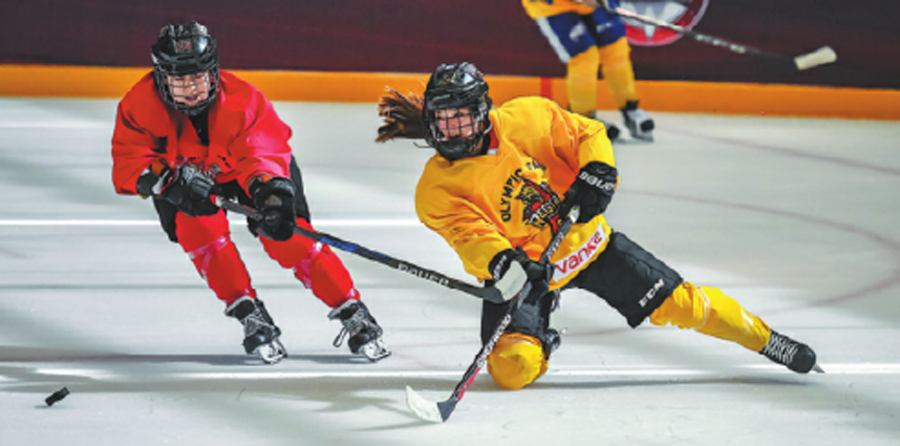Adding more depth to the talent pool
 0 Comment(s)
0 Comment(s) Print
Print E-mail China Daily, May 19, 2018
E-mail China Daily, May 19, 2018

As host of the 2022 Winter Olympics, China is committed to an ongoing overseas talent hunt to bolster its chances of winning a medal in women's hockey at the Games.
After first-year Shenzhen Kunlun Red Star came within one win of capturing the professional Canadian Women's Hockey League championship last season, efforts to meld homegrown and overseas Chinese talent into a cohesive national team are being ramped up.
At the ongoing Olympic development camp hosted by Red Star in Shenzhen, 22 Canadian and American players of Chinese descent have joined 38 locals from Heilongjiang province, the country's traditional hockey power, for physical tests, skill evaluation, drills and practice games under American coach Rob Morgan, who has two decades of coaching experience in NCAA.
"The locals and overseas players will help each other and eventually merge into one strong force," said Morgan, who served as head coach of China's other CWHL expansion entry, the Wanke Rays "The transition is happening, but it's going to take time."
Speaking to China Daily on Wednesday after a game between a select team of Chinese North Americans and local players at Shenzhen Universiad Stadium, Morgan outlined the long-term plan.
"The local Chinese have to want to get better. I hope that by them seeing these young North Americans, it inspires them and motivates them to do more to get stronger and faster. We are putting together a four-year plan, including regular development camps and overseas drills, that I believe will help position China for a medal in 2022."
The Chinese Ice Hockey Association organized its first Olympic tryout camps in Toronto and Vancouver last June, drafting dozens of Chinese North Americans into its men's and women's talent pools.
Bolstered by draftees from those camps, Shenzhen Red Star finished second in its debut CWHL season, providing testament for the experimental program of merging talents across borders.
"Four years is going to go by very fast but it's also a long process," said Leah Lum, a graduate of the University of Connecticut's NCAA Division I program.
"But we are willing to do whatever it takes to be able to play in the Olympics by sticking around and putting in the work," added the fourth-generation Chinese Canadian, who scored 42 goals in 149 games for the UConn Huskies from 2014-18.
"Growing up in Canada, it's always a dream to go to the Olympics as a hockey player. If it's not for Canada, China is a natural choice. I would cherish the honor of representing my ancestral country at the Olympics in 2022."
Lum's compatriot Jacqueline Tam, who will report to Brown University's NCAA program in the fall, said being invited to the camp has already made her family proud.
"My grandparents came from Guangdong, where we are now, and they feel super excited for me. It's a once-in-a-lifetime opportunity," said the 18-year-old.
According to IIHF rules, in order to be eligible to represent an adopted country on the international stage, female players must have at least one season playing in the national competition after gaining its passport.
Men need two consecutive seasons away from the Olympics under the same rules.
South Korea reaped the benefit of that policy when its men's national team qualified for the recent Pyeongchang Olympics with the help of seven naturalized players from North America.
The CIHA has revealed that China will make its current passport-issuing policy work in favor of the Olympic program, but its naturalization radar will only target those with Chinese ancestry.
"They are different from us in terms of the understanding of the game, but I think us combining as one and working toward the same goal will resonate emotionally with the crowd by the time of 2022," national team member Yu Baiwei said of the imports.
The CIHA, with support from Kunlun Red Star, will host more tryout camps in China and abroad to keep the talent recruitment drive rolling.
A panel of experts, including Morgan, will rank all prospects in terms of physicality, skills and hockey sense to eventually build the Olympic team-and hopefully improve on the national women's squad's current world ranking of No 20.






Go to Forum >>0 Comment(s)